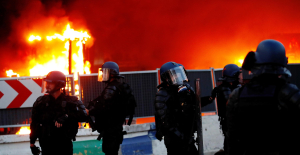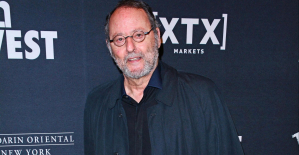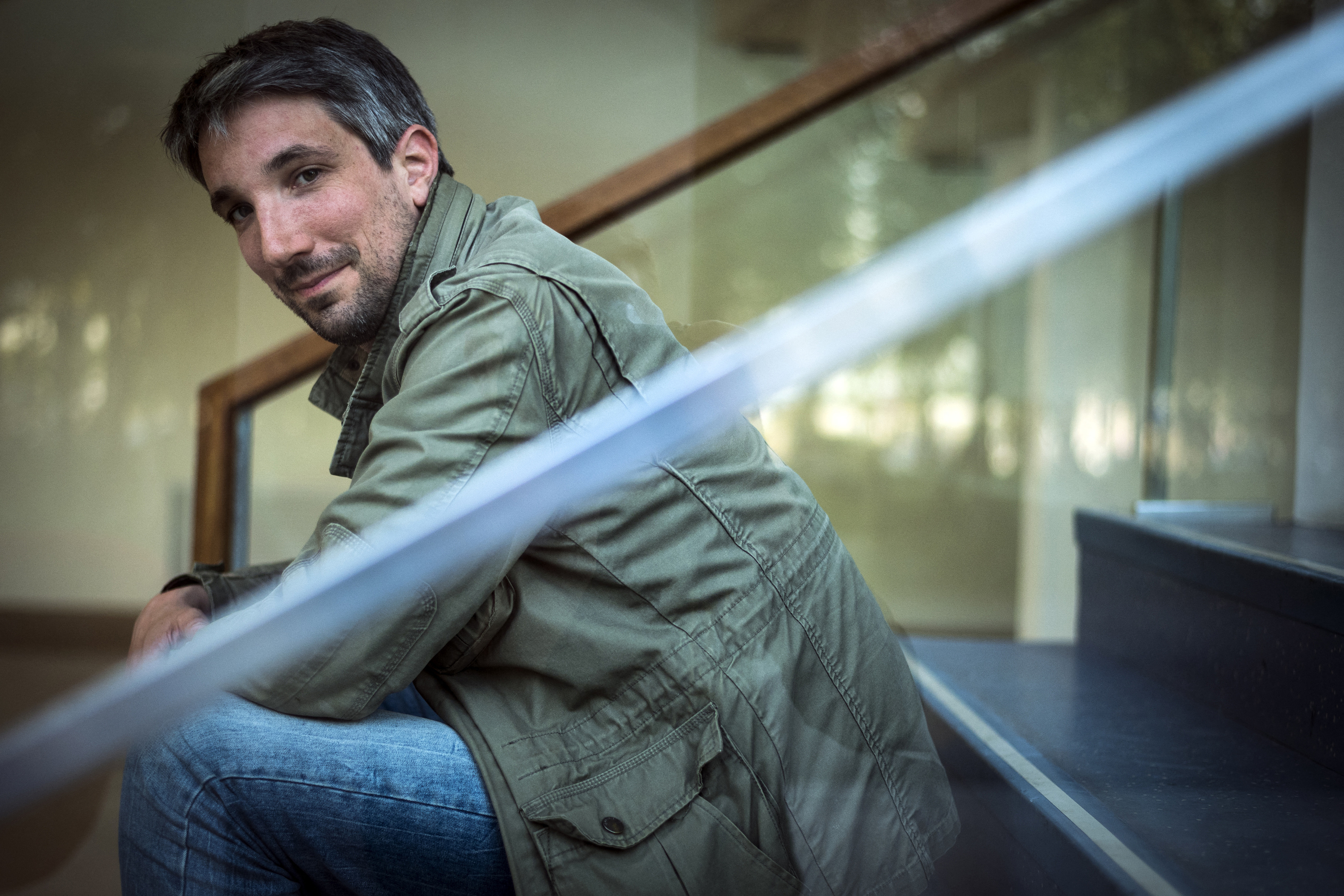Amidst the ruins in the eastern Ukrainian frontline town of Chasiv Yar, in front of the shattered window of a high-rise building, Ukrainian soldiers are looking for Russians on Monday afternoon. 25-year-old Bogdan Borodai, part of the 24th Battalion "Aidar", operates a gamepad with buttons and stares at a screen. Then he sees what their little drone is filming from the air. “That there,” says Borodai, tapping the screen, “is a tank. Every few hours we spot a bunch of Russian soldiers here.”
Their drones from the Chinese manufacturer DJI, which cost thousands of euros, fly up to 15 kilometers, often to the currently fiercely contested city of Bachmut. Borodai and his team transmit what they film in real time to screens in their higher-level command center. There decisions are made about the shelling of exposed positions.
For their drone reconnaissance, Borodai and his team rely on the assistance of a white handheld device they have placed nearby. These are Starlink terminals from the US company SpaceX, founded by Tesla boss Elon Musk.
These terminals ensure Ukrainian soldiers a stable and fast Internet connection everywhere, even in places like Chasiv Yar, where much of the infrastructure was bombed by Russian troops. "Starlink is one of the most important tools we have in this war," says Borodai. "If that goes away now, that would be a slap in the face."
The soldier's concern has a current background. In early February, SpaceX announced that it would restrict the Ukrainian military's use of Starlink to control drones. Reason according to Gwynne Shotwell, President of SpaceX: The terminals were "never intended as a weapon", but only as a support to defend against the Russian military. There are said to be more than 20,000 Starlink terminals in Ukraine, almost a fifth of which the company provided free of charge.
Musk's devices have given the Ukrainian military advantages in crucial situations of this war. When the last Ukrainian soldiers stayed in the steelworks in the Russian-taken city of Mariupol in spring 2022, they kept in touch with the outside world via the terminals - even in a phone call with President Volodymyr Zelenskyy. When Ukrainian troops liberated the previously occupied city of Kherson in mid-November, civilians sent a sign of life to loved ones over the Starlink connection.
Olga Boichak, lecturer in digital culture at the University of Sydney, fears devastating consequences for Ukraine if Starlink is restricted. "SpaceX's decision to end the service for its Ukrainian users at a time when they need it most will likely take a catastrophic human toll," she told WELT.
The Ukrainian military needs high-speed internet to coordinate maneuvers, including transmitting aerial photographs. This currently makes Starlink a core part of the Ukrainian communications infrastructure. "Turning off the devices would directly sabotage Ukraine's defense efforts and make the country's people more vulnerable to Russia's atrocities." The people of Ukraine should no longer let a private tech company decide their fate.
According to WELT research on site in Bachmut, there are already increasing disruptions when using the terminals. "We've had a massive problem with Starlink for about a week," says Oleksiy, a unit commander within the 93rd Brigade. According to him, it looks as if the speed has been throttled. The communication at the front with the command center, which was dependent on the portable devices, was partially interrupted. Two other soldiers in Bakhmut and Chasiv Yar who work with Starlink report problems to WELT. It currently takes much longer to establish a connection at all.
In a piece of forest less than 15 minutes by car from Bachmut, the transmission works on this bitterly cold afternoon. Commander Andrej, who only wants to give his combat name "Chechen", mumbles announcements into his radio. Two soldiers are standing in front of him at a Soviet 122 mm howitzer D30, one of them suddenly shouts: "Harmata!" The signal for firing. Shortly thereafter, it thunders and smokes.
The coordinates for the target they are shooting at here were given shortly beforehand by a drone team in the area. Andrej's team has also firmly integrated Starlink into their processes. The 26-year-old trudges through the snow to the device set up next to a hut. “We use the terminal to give orders and correct artillery fire. We're also getting intel on where the front lines are so we can deploy supplies."
The commander says that there are alternatives to Starlink. But no other system is as stable and fast. A cessation would have dramatic consequences. If Elon Musk is of the opinion that Starlink should not be used as an offensive weapon, his argument in Ukraine will fail. “We are like an organism that carries a virus called Russia. And Starlink is like a pill that helps us heal.”
Similarly, Selenskyj consultant Mychajlo Podoljak recently rejected SpaceX's arguments in the WELT interview. “Because we are waging a defensive war within the framework of international law to liberate occupied territories. We do not attack other states.”
Separately, Ukrainian troops also carry out attacks with armed drones, often armed with small grenade launcher ammunition. But according to the soldiers, these attacks are currently difficult, especially in Bachmut, because the Russians shoot down the aircraft or use so-called jamming. They send jamming signals to throw the drone off course.
Scientist Boichak even considers SpaceX's reasoning for restricting the terminals in Ukraine to be hypocritical. "While SpaceX is positioning itself as a technology for civilian use, the company was recently involved in a collaborative research and development agreement with the US Department of Defense. This included the study and testing of Starlink's applications on the battlefield.
Musk, the company's founder, has made several controversial statements about the war in Ukraine. In October, weeks before the liberation of Kherson, he tweeted his vision of a peace plan. Among other things, he suggested that Crimea be recognized as part of Russia and that Ukraine remain "neutral" in the future. At the end of October, according to a CNN report, 1,300 Starlink devices belonging to the Ukrainian military temporarily failed. The failure was justified at the time with a reference to "lack of financing". The company had previously complained to the US government that it could no longer pay for the terminals itself.

 What is chloropicrin, the chemical agent that Washington accuses Moscow of using in Ukraine?
What is chloropicrin, the chemical agent that Washington accuses Moscow of using in Ukraine? Poland, big winner of European enlargement
Poland, big winner of European enlargement In Israel, step-by-step negotiations for a ceasefire in the Gaza Strip
In Israel, step-by-step negotiations for a ceasefire in the Gaza Strip BBVA ADRs fall almost 2% on Wall Street
BBVA ADRs fall almost 2% on Wall Street Breast cancer: less than one in two French women follow screening recommendations
Breast cancer: less than one in two French women follow screening recommendations “Dazzling” symptoms, 5,000 deaths per year, non-existent vaccine... What is Lassa fever, a case of which has been identified in Île-de-France?
“Dazzling” symptoms, 5,000 deaths per year, non-existent vaccine... What is Lassa fever, a case of which has been identified in Île-de-France? Sánchez cancels his agenda and considers resigning: "I need to stop and reflect"
Sánchez cancels his agenda and considers resigning: "I need to stop and reflect" The Federal Committee of the PSOE interrupts the event to take to the streets with the militants
The Federal Committee of the PSOE interrupts the event to take to the streets with the militants The growth gap between Europe and the United States will narrow in 2025
The growth gap between Europe and the United States will narrow in 2025 A report recommends the creation of a “riot fund” to cover communities
A report recommends the creation of a “riot fund” to cover communities With 3.5 billion euros collected, life insurance recorded its best month in 10 years in March
With 3.5 billion euros collected, life insurance recorded its best month in 10 years in March Volvic factory shut down after “an act of malicious intent”: production can resume “at the earliest” on Friday
Volvic factory shut down after “an act of malicious intent”: production can resume “at the earliest” on Friday Jean Reno publishes his first novel Emma on May 16
Jean Reno publishes his first novel Emma on May 16 Cannes Film Festival: Meryl Streep awarded an honorary Palme d’Or
Cannes Film Festival: Meryl Streep awarded an honorary Palme d’Or With A Little Something Extra, Artus and his disabled actors do better than Intouchable on the first day
With A Little Something Extra, Artus and his disabled actors do better than Intouchable on the first day Madonna ends her world tour with a giant - and free - concert in Copacabana
Madonna ends her world tour with a giant - and free - concert in Copacabana Omoda 7, another Chinese car that could be manufactured in Spain
Omoda 7, another Chinese car that could be manufactured in Spain BYD chooses CA Auto Bank as financial partner in Spain
BYD chooses CA Auto Bank as financial partner in Spain Tesla and Baidu sign key agreement to boost development of autonomous driving
Tesla and Baidu sign key agreement to boost development of autonomous driving Skoda Kodiaq 2024: a 'beast' plug-in hybrid SUV
Skoda Kodiaq 2024: a 'beast' plug-in hybrid SUV The home mortgage firm rises 3.8% in February and the average interest moderates to 3.33%
The home mortgage firm rises 3.8% in February and the average interest moderates to 3.33% This is how housing prices have changed in Spain in the last decade
This is how housing prices have changed in Spain in the last decade The home mortgage firm drops 10% in January and interest soars to 3.46%
The home mortgage firm drops 10% in January and interest soars to 3.46% The jewel of the Rocío de Nagüeles urbanization: a dream villa in Marbella
The jewel of the Rocío de Nagüeles urbanization: a dream villa in Marbella Europeans: a senior official on the National Rally list
Europeans: a senior official on the National Rally list Blockade of Sciences Po: the right denounces a “drift”, the government charges the rebels
Blockade of Sciences Po: the right denounces a “drift”, the government charges the rebels Even on a mission for NATO, the Charles-de-Gaulle remains under French control, Lecornu responds to Mélenchon
Even on a mission for NATO, the Charles-de-Gaulle remains under French control, Lecornu responds to Mélenchon “Deadly Europe”, “economic decline”, immigration… What to remember from Emmanuel Macron’s speech at the Sorbonne
“Deadly Europe”, “economic decline”, immigration… What to remember from Emmanuel Macron’s speech at the Sorbonne These French cities that will boycott the World Cup in Qatar
These French cities that will boycott the World Cup in Qatar NBA: the Pacers and the Knicks will be there in the play-off semi-finals
NBA: the Pacers and the Knicks will be there in the play-off semi-finals Tennis: like last year, Sabalenka joins Swiatek in the final in Madrid
Tennis: like last year, Sabalenka joins Swiatek in the final in Madrid OM: scorer against Bergamo, Mbemba moved after the final whistle
OM: scorer against Bergamo, Mbemba moved after the final whistle OM-Atalanta: the lines of the match
OM-Atalanta: the lines of the match


















